How Neocons Push for War by Cooking the Books
To understand America’s drift into despotism over the last 40 years, we must de-encrypt the evolution of its secret "double government."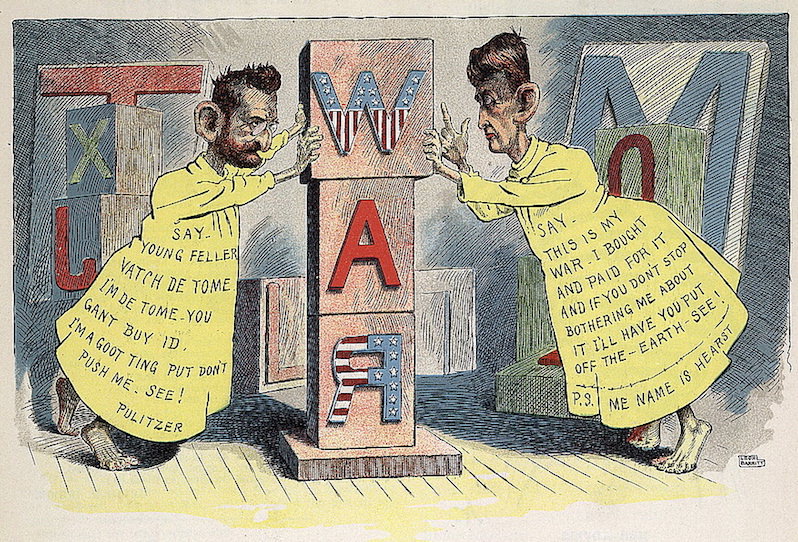 An 1898 editorial cartoon by Leon Barritt. The cartoon features newspaper publishers Joseph Pulitzer, left, and William Randolph Hearst dressed as Yellow Kid, a popular cartoon character of the day. It is a satire of their papers' role in drumming up U.S. public opinion to go to war with Spain. (Wikimedia)
1
2
An 1898 editorial cartoon by Leon Barritt. The cartoon features newspaper publishers Joseph Pulitzer, left, and William Randolph Hearst dressed as Yellow Kid, a popular cartoon character of the day. It is a satire of their papers' role in drumming up U.S. public opinion to go to war with Spain. (Wikimedia)
1
2
Orwell is said to have modeled his novel “1984” on Burnham’s vision of the coming totalitarian state, which he described as “a new kind of society, neither capitalist nor Socialist, and probably based upon slavery.”
As a Princeton- and Oxford-educated scholar (one of his professors at Balliol College was J.R.R. Tolkien), Burnham landed a position as a writer and an instructor in the philosophy department at New York University just in time for the 1929 Wall Street crash. Although initially uninterested in politics and hostile to Marxism, by 1931, Burnham was radicalized by the Great Depression and, alongside fellow NYU philosophy instructor Sidney Hook, was drawn to Marxism.
Burnham found Trotsky’s use of “dialectical materialism” to explain the interplay between the human and the historical forces in his “History of the Russian Revolution” to be brilliant. His subsequent review of Trotsky’s book would bring the two men together and begin for Burnham a six-year odyssey through America’s Communist left that would, in this strange saga, ultimately transform him into the agent of its destruction.
As founder of the Red Army and a firebrand Marxist, Trotsky had dedicated his life to the spread of a worldwide Communist revolution. Stalin opposed Trotsky’s views as being too ambitious, and the power struggle that followed Lenin’s death splintered the party. By their very nature, the Trotskyists were expert at infighting, infiltration and disruption.
Burnham reveled in his role as a Trotskyist intellectual and in the endless debates over the fundamental principle of Communism (dialectical materialism) behind Trotsky’s crusade. The “Communist Manifesto” approved the tactic of subverting larger and more populist political parties (entryism), and following Trotsky’s expulsion from the Communist party in November 1927, his followers exploited it. The most well-known example of entryism was the so-called French turn, when in 1934 the French Trotskyists entered the much larger French Socialist Party (the SFIO) with the intention of winning over the more militant elements to their side.
That same year, the American followers of Trotsky in the Communist League of America (the CLA) did a French turn on the American Workers Party (the AWP) in a move that elevated the AWP’s James Burnham into the role of a Trotsky lieutenant and chief adviser.
Burnham liked the toughness of the Bolsheviks and despised the weakness of the liberals. According to his biographer, Daniel Kelly: “He took great pride in what he saw as its hard-headed view of the world in contrast to philosophies rooted in ‘dreams and illusions.’ ” Burnham also delighted in the tactics of infiltrating and subverting other leftist parties and in 1935 “fought tirelessly for the French turn” of a far larger Socialist Party (the SP), some 20,000 strong. The Trotskyists intended “to capture its left wing and its youth division, the Young People’s Socialist League (YPSL),” Kelly wrote, “and take the converts with them when they left.”
Burnham remained a “Trotskyist intellectual” from 1934 until 1940. But although he labored six years for the party, it was said of him that he was never of the party, and as the new decade began, he renounced both Trotsky and “the ‘philosophy of Marxism’ dialectical materialism” altogether. He summed up his feelings in a letter of resignation on May 21, 1940: “Of the most important beliefs, which have been associated with the Marxist Movement, whether in its reformist, Leninist, Stalinist or Trotskyist variants, there is virtually none which I accept in its traditional form. I regard these beliefs as either false or obsolete or meaningless; or in a few cases, as at best true only in a form so restricted and modified as no longer properly to be called Marxist.”
In 1976, Burnham wrote to a legendary secret agent, identified by biographer Kelly as the British political analyst Brian Crozier, that he had never swallowed dialectical materialism or the ideology of Marxism but was merely being pragmatic given the rise of Hitler and the Depression.
But given the influential role Burnham would come to play in creating the new revolutionary class of neoconservatives, and their central role in using Trotsky’s tactics to lobby against any relationship with the Soviet Union, it’s hard to believe Burnham’s involvement with Trotsky’s Fourth International was only an intellectual exercise in pragmatism.
Part 3 of “Universal Empire” will be published Wednesday and will explore how James Burnham’s involvement with the Office of Strategic Services (OSS) and the creation of the Congress for Cultural Freedom set the stage for a sophisticated doctrinal campaign that would neutralize any political opposition (Communist or not) to Anglo-American culture and make the world safe for the rise of the Machiavellian elite.
Part 1: American Imperialism Leads the World Into Dante’s Vision of Hell
Part 3: How the CIA Created a Fake Western Reality for ‘Unconventional Warfare’
Paul Fitzgerald and Elizabeth Gould are the authors of “Invisible History: Afghanistan’s Untold Story,” “Crossing Zero: The AfPak War at the Turning Point of American Empire” and “The Voice.” Visit their websites at invisiblehistory.com and grailwerk.com.
Your support matters…
SUPPORT TRUTHDIG
Independent journalism is under threat and overshadowed by heavily funded mainstream media.
You can help level the playing field. Become a member.
Your tax-deductible contribution keeps us digging beneath the headlines to give you thought-provoking, investigative reporting and analysis that unearths what's really happening- without compromise.
Give today to support our courageous, independent journalists.
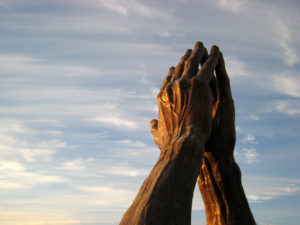
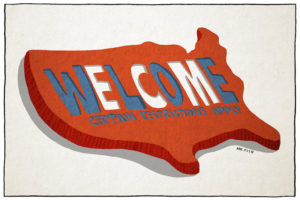
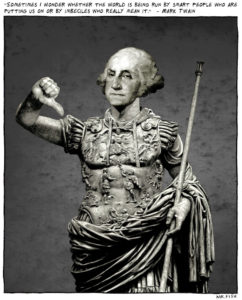

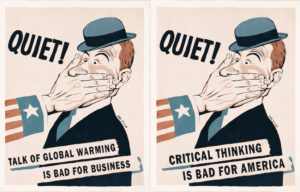
You need to be a supporter to comment.
There are currently no responses to this article.
Be the first to respond.